| INVESTIGATION Maldivian autocrat’s family’s illegal ‘oil trade’ allegedly worth $800 million By Sumon K. Chakrabarti/Male 2011 does not bode well for autocrats, past and present. In January, the Jasmine Revolution swept away Tunisian autocrat Zine el Abidine Ben Ali; Egypt’s Mohamed Hosni Mubarak has promised to leave. Protests are growing louder in Algeria, Yemen, Jordan and Syria. But one former autocrat is quietly trying to make a comeback, just two and a half years after being unseated. Asia’s longest ruling head of state, Maumoon Abdul Gayoom, wants to be back. A self-confessed Mubarak fan, the Cairo-educated Gayoom ruled the Maldives for 30 years. Maldivian President Mohamed Nasheed’s response to Gayoom bid was an ominous one-liner: “It will not be wise.” Nasheed had defeated Gayoom in the country’s first ever democratic elections in 2008. Why does Gayoom want to come back and what was Nasheed hinting at? The answer, apparently, lies in Singapore. In March 2010, the Maldives commissioned Grant Thornton to investigate the hidden assets of Gayoom, his family and associates. Grant Thornton is a global network of 2,600 independent financial consultancy firms. In 2008, the Maldives auditor general had blamed Gayoom for using government funds and national institutions for personal benefit. In mid-2010, the Singapore Police began an official criminal investigation into the Gayoom family’s money laundering operations, now estimated to be somewhere in the region of $800 million. THE WEEK accessed a copy of the Grant Thornton investigation report submitted to Nasheed’s office. The report names Abdullah Yameen Abdul Gayoom, the former president’s half-brother, as the kingpin of the money laundering operation. It also names a key player in the operation—Myanmar’s military junta, the State Peace and Development Council. The Gayooms had links with Brigadier-General Lun Thi, the Myanmar minister of energy, and with Vice-Senior General Maung Aye, the second highest-ranking member of the junta. The bridge between the Gayooms and Aye was Aung Ko Win, a Myanmar businessman who heads the Kanbawza Bank and Kanbawza Football Club. The Gayooms received additional help from Aung Thaung, the Burmese minister of industry-1. Thaung’s son Major Pye Aung is married to Aye’s daughter, Nandar Aye. Another Burmese business couple, Tun Myint Naing aka Steven Law and wife Cecilia Ng, were also linked to the Gayooms. Law is the son of Lo Hsing Han, the heroin baron. The Han family runs Asia World Co. Ltd, which, among many other ventures, runs the Rangoon port. The US treasury department’s office of foreign assets control had accused Law of being part of his father’s drug empire and had blacklisted his companies. Cecilia has been under the scanner for allegedly laundering the Burmese junta’s money through shadow ventures in Singapore. So what did the Gayooms, the junta and the shadowy businessmen together do? The Maldives receives subsidised oil from OPEC nations, thanks to its 100 per cent Sunni Muslim population. The Gayooms bought oil, saying it was for the Maldives, and sold it to Myanmar and on the international black market. As Myanmar is facing international sanctions, the junta secretly sold the Burmese and ‘Maldivian’ oil to certain Asian countries, including a wannabe superpower. One of the four cabinet ministers with whom the Grant Thornton report was shared told THE WEEK. “What is now becoming clear is that oil tankers regularly left Singapore for the Maldives, but never arrived here,” he said. “We are a tiny nation, our oil consumption is very less. The State Trading Organisation Plc [STO] of the Maldives used to buy oil, mostly from OPEC nations, and sell it in the black market or to Myanmar.” The STO was established in 1964 to stabilise prices of essential commodities. The Maldivian government holds 92.29 per cent stake in the STO and the rest is held by the public. For smoother trading, a subsidiary company, STO Maldives (Singapore) Pvt Ltd, was set up in 1997. STO Singapore’s mandate was initially limited to purchasing petroleum products for the Maldives. Later, the company was authorised to trade in petroleum. Majority of its sales were to the STO and to Myanmar, except in 2002, when bulk of the revenue came from Malaysia. STO Singapore bought fuel from Shell Eastern Petroleum Pvt Ltd, the Singapore Petroleum Company Ltd and Petronas, and then sold it to STO or to third parties. The allegation is that the Gayooms used STO Singapore for their oil diversion and money laundering racket. Sources in the Singapore Police said their investigation has confirmed “shipping fraud through the diversion of chartered vessels where the oil cargo intended for the Maldives was sold on the black market creating a super-profit for many years.” In the report to Nasheed, Grant Thornton said it could only access financial information from 2002 to 2008 from the three hard-drives given to it by the President’s Commission, which probes the allegations of corruption and misappropriation of assets. No digital data before 2002 was available and the paper trail was hazy. While Gayoom was president, his half-brother Yameen was minister for tourism and civil aviation, and, in 1990, he was made chairman of STO and minister for trade. He stepped down as STO chairman in 2005, but STO Singapore’s debit notes show payments made on account of Yameen in 2007 and 2008. Yameen was allegedly aided by Ahmed Muneez, former MD, STO Singapore, and by Mohamed Hussain Maniku, former MD, STO. Maniku was MD from 1993 to 2008, and currently represents the Maldives in Washington, DC. The Grant Thornton report said: “The debit notes were created as a result of receiving funds from Mr Yameen deposited at the STO head office, which were then transferred to STO Singapore’s bank accounts. This corresponded with a document received from STO head office confirming the payments were deposited by Yameen into STO’s bank accounts via cheque. In conversation with Mr Muneez, this was to provide monies for the living expenses of his [Yameen’s] son and daughter, both studying in Singapore. Their living expenses were distributed by Mr Muneez.” This arrangement ended just before Gayoom lost power. A bureaucrat in the President’s Office in Male said that it was highly unusual for a former chairman to use a company’s bank accounts for personal money transfer. He said: “Yameen had previously requested Gayoom to send letters to foreign leaders and ministers with regard to oil production and sale.” The first red flag regarding the Gayooms’ underhand deals was raised by KPMG Sri Lanka, which took over STO’s audits from PricewaterhouseCoopers in 2004. A KPMG note in 2004 said: “A company incorporated in Singapore by the name of Mocom Trading Pte Ltd in 2004 has not been disclosed under Note No. 30 to the Financial Statements. There was no evidence available with regard to approval of the incorporation. Further, we are unable to establish the volume and the nature of the company with the group.” In 2005, KPMG raised the same objections and said: “The name of the company [Mocom Trading Pte Ltd] has been struck off on 20th April 2006.” Mocom Trading Pte Ltd led directly to the Burmese junta and businessmen mentioned earlier in this story. Mocom Trading was set up in February 2004 as a joint venture between STO Singapore and Mocom Corporation Sdn Bhd, a Malaysian corporation. The JV was floated to sell oil to Myanmar. Authorised capital was $10,00,000. Number of shares? Four. Shareholders were Kamal Bin Rashid, a Burmese national; Raja Abdul Rashid Bin Raja Badiozaman, a Malaysian, and Fathimah Ashan and Sana Mansoor, both Maldivians. All four shareholders were directors, and there was a fifth director—Muneez. Muneez told investigators that Mocom Corporation was one of the four companies which had the right to sell oil to Myanmar through a tender process. The other three were Daewoo, Petrocom Energy and Hyundai. Later, Mocom Corporation floated the joint venture with STO Singapore. According to the contract, STO Singapore was to supply Mocom Trading with diesel. But since Mocom Corporation held the original contract, the company was entitled to a commission of nearly 40 per cent of the profits. The commission was to be deposited in a United Overseas Bank account in Singapore—a US dollar account held solely by Rashid. So, the books would show that the commission was being paid to Mocom, but Rashid would pocket it. This is just one of the many examples of the STO’s books being cooked. In another example, STO Singapore and Mocom Trading duplicated sales invoices to Myanmar. The invoices showed the number of barrels delivered and the unit price. Both sets of invoices were identical, except for the price per barrel. The unit price on the STO Singapore invoices was around $5 more than the unit price on the Mocom Trading invoices. This was done to confuse auditors. The sum total of all Mocom Trading invoices to Myanmar Petrochemical Enterprises was $4,57,51,423, whereas the sum total of the invoices raised by STO Singapore was $5,14,23,523. The difference? $56,72,100. Gayoom’s fall in 2008 had a direct link to the fortunes of STO Singapore. Its revenues had jumped dramatically in 2001-2002, after which annual sales hovered around 100 million Singapore dollars. From 2006 onwards sales started falling. In 2009, it dropped to 17 million Singapore dollars, its lowest returns to date. Investigators have found instances where bills of lading were unsigned by the ship’s master. The bill of lading is a very crucial document as it is a detailed receipt given by the carrier to the person consigning the goods. The Gayooms and Muneez had devised strategies to fool even the best of investigators. “They forgot that one small glitch can blow the lid off a perfect con job,” said Ibrahim Hussain Zaki, special envoy of the president of the Maldives. Chakrabarti, CNN-IBN’s chief national correspondent, is writing a book on the Gayoom regime and its fall. |
Wednesday, 23 February 2011
သန္းေရႊ၊ ေမာင္ေအး၊လြန္သီ၊ ေအာင္ေသာင္း ၊ စတီဗင္ေလာ နဲ ့ စီဆီလီယာ (စတင္ဗင္ေလာမိန္းမ)တို ့ ရဲ ့ စီးပြားေရးအရႈပ္ေတာ္ပံု
at
14:32
![]()
Subscribe to:
Post Comments
(
Atom
)





















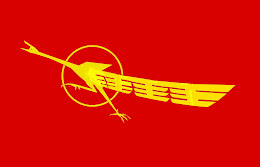





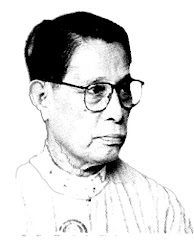


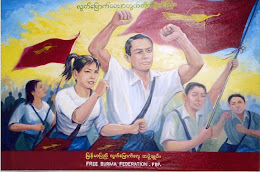





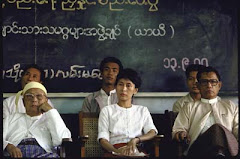

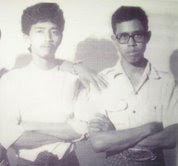

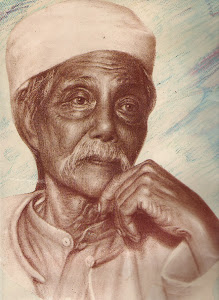
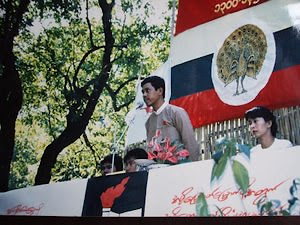
1 comment :
MOE HAY KO????????. Girl friend of a smuggler/broker from Singapore??? what the #*@#.
Post a Comment